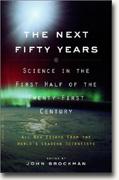The Next 50 Years
John Brockman (Editor)
book reviews:
· general fiction
· chick lit/romance
· sci-fi/fantasy
· graphic novels
· nonfiction
· audio books
· author interviews
· children's books @
curledupkids.com
· DVD reviews @
curledupdvd.com
newsletter
win books
buy online
links
home
for authors
& publishers
for reviewers

 |
The Next Fifty Years: Science in the First Half of the 21st Century John Brockman (Editor) Vintage Books Paperback 320 pages May 2002 |
|
Although Iíve lumped professions together, one canít generalize about the content of a groupís essays. Each work is full of novel and wise observations. Science merges into philosophy, hard prediction into soft moralizing, and speculation about genetic determinism into lessons on how we learn or raise children. Many are full of detailed forecasts. Questions abound, and not just scientific ones. If we can see on scanners how the brain reacts to the stimulation of drugs and psychotherapy and tailor the results, as we learn that genetic predispositions guide our reactions, what happens to the concept of free will? Will there be an amygdala defense for murder? What responsibilities do we have in regard to genetic engineering? If we can improve our children, what should be the goals? Happiness? Can we define it? What will be the impact on society? At what point will implants, transplants, and pharmacology exceed a definition of human? Do we really want to know our genome? Our fate may be written there. Should there be laws of neuroethics? Are we but in one of many universes and, if so, how does that theory help us? Should science change direction from hard answer-finding and move toward nurturing? Since advanced science must increasingly deal with complex systems and causes, will the computers we invent to make sense out of that chaos go beyond humanity? Make us irrelevant? A stimulating book, and lucidly written -- highly recommended. © 2002 by Dean Warren for Curled Up With a Good Book |
| Also by John Brockman: |
|
|
|
 Click here to learn more about this month's sponsor! |
|
| fiction · sf/f · comic books · nonfiction · audio newsletter · free book contest · buy books online review index · links · · authors & publishers reviewers |
|
| site by ELBO Computing Resources, Inc. | |
 The roster of authors reflects the waves of science that have pulsed, one following another, through our civilization over the last hundred years. ďOnlyĒ two physicists specify questions remaining from the nuclear, relativity, and quantum revolutions of the first thirty years and bemoan the questions of scale that handicap further progress. Five biologists review their fieldís exploits since Crick and Watson defined the DNA molecule in 1953 and predict a fabulous exploitation of genetic knowledge. And three neuroscientists, three computer scientists, and eight psychologists or psychiatrists expound on the various ways wiring and genetic understandings of the brain will come about and transform our civilization. One astronomer, two mathematicians, and one chemist round out the group.
The roster of authors reflects the waves of science that have pulsed, one following another, through our civilization over the last hundred years. ďOnlyĒ two physicists specify questions remaining from the nuclear, relativity, and quantum revolutions of the first thirty years and bemoan the questions of scale that handicap further progress. Five biologists review their fieldís exploits since Crick and Watson defined the DNA molecule in 1953 and predict a fabulous exploitation of genetic knowledge. And three neuroscientists, three computer scientists, and eight psychologists or psychiatrists expound on the various ways wiring and genetic understandings of the brain will come about and transform our civilization. One astronomer, two mathematicians, and one chemist round out the group.